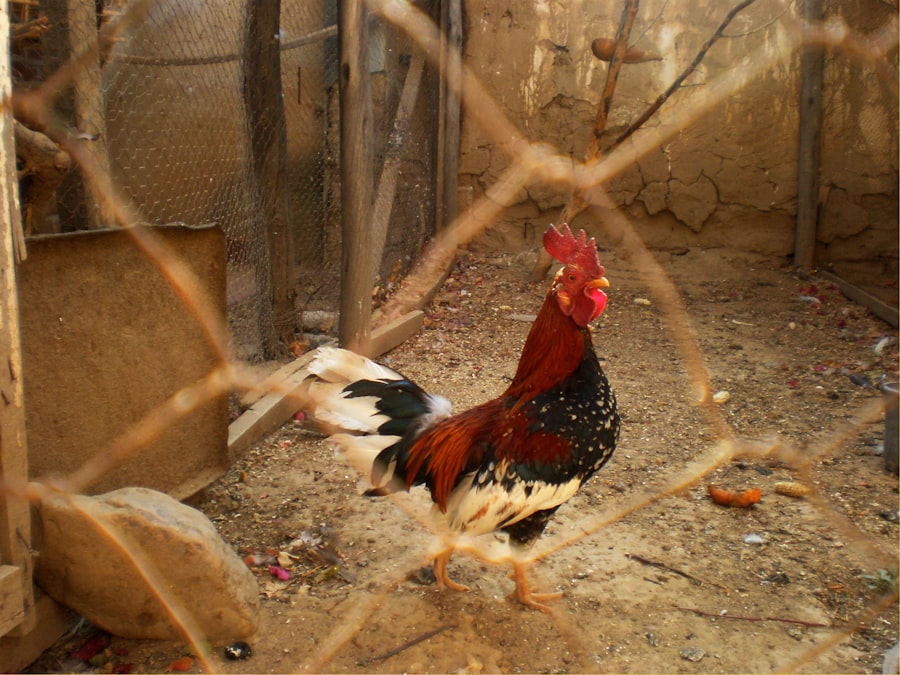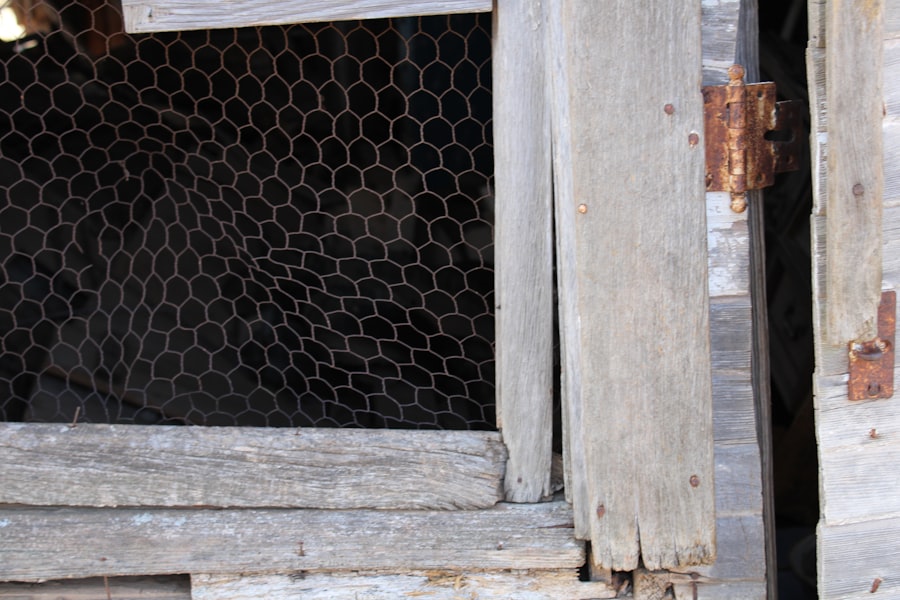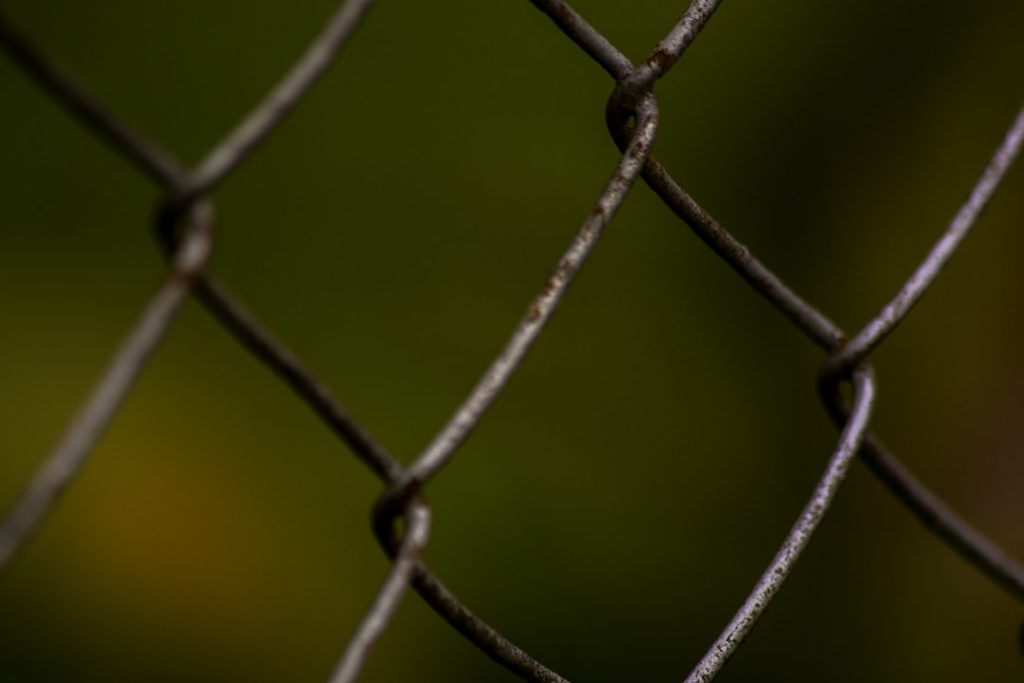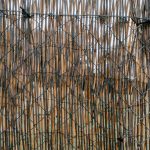Chickens are naturally curious and active animals that exhibit a variety of behaviors, including scratching. Scratching is a natural behavior for chickens, as it allows them to forage for food, dust bathe, and create comfortable nesting areas. Chickens use their feet to scratch at the ground, searching for insects, seeds, and other edible items.
This behavior is essential for their physical and mental well-being, as it provides them with exercise and mental stimulation. Understanding the natural behavior of chickens is crucial in addressing scratching issues, as it allows for the implementation of effective and humane solutions. Chickens also scratch as a way to regulate their body temperature and maintain good hygiene.
They use dust baths to clean their feathers and skin, which helps to remove parasites and excess oils. Additionally, scratching helps to aerate the soil and promote healthy plant growth. It is important to recognize that scratching is an instinctual behavior for chickens and should be managed in a way that respects their natural tendencies.
By understanding the reasons behind scratching behavior, chicken owners can implement strategies that address the root causes of excessive scratching while still allowing chickens to engage in their natural behaviors.
Table of Contents
- 1 Choosing the right type of mulch
- 2 Creating barriers to prevent scratching
- 3 Providing alternative scratching areas
- 4 Using deterrents to discourage scratching
- 5 Regularly monitoring and training chickens
- 6 Seeking professional advice for persistent scratching issues
- 7 FAQs
- 7.1 What is the problem with chickens scratching in mulch?
- 7.2 How can I keep chickens from scratching in mulch?
- 7.3 Are there any plants or materials that can deter chickens from scratching in mulch?
- 7.4 What are the benefits of using mulch in a chicken coop or run?
- 7.5 Is it safe for chickens to be around mulch?
Key Takeaways
- Chickens scratch to forage for food and dust bathe, which is a natural behavior.
- Organic mulch, such as straw or wood shavings, is a good choice for chicken coops.
- Barriers like fencing or landscaping fabric can help prevent chickens from scratching in unwanted areas.
- Providing designated scratching areas with loose soil or sand can redirect chickens’ natural behavior.
- Deterrents like chicken wire or motion-activated sprinklers can discourage chickens from scratching in specific areas.
- Regularly monitoring and training chickens can help manage their scratching behavior.
- Seek professional advice, such as from a veterinarian or animal behaviorist, for persistent scratching issues.
Choosing the right type of mulch
Benefits of Mulch in Chicken Living Areas
One effective way to manage scratching behavior in chickens is by using mulch in their living areas. Mulch can help to create a barrier between the ground and the chickens, reducing the impact of their scratching.
Popular Mulch Options for Chicken Coops
When choosing the right type of mulch, it is important to consider factors such as durability, safety, and availability. Wood shavings, straw, and pine needles are popular choices for chicken coop mulch, as they are affordable and readily available. These materials also provide a comfortable surface for chickens to walk on and can help to absorb moisture and odors.
Safety Considerations for Mulch Selection
Another important consideration when choosing mulch for chicken areas is safety. Some types of mulch, such as cocoa bean hulls, can be toxic to chickens if ingested. It is crucial to research the potential risks associated with different types of mulch and select a safe option for chicken enclosures.
Maintenance and Effectiveness of Mulch
Additionally, mulch should be regularly replenished to maintain its effectiveness in preventing excessive scratching. By choosing the right type of mulch for chicken areas, owners can create a comfortable and safe environment for their birds while managing scratching behavior effectively.
Creating barriers to prevent scratching

Creating physical barriers can be an effective way to prevent chickens from causing damage through excessive scratching. Fencing off sensitive areas such as garden beds or newly planted areas can help to protect them from the destructive effects of chicken scratching. Using materials such as chicken wire or hardware cloth can create a barrier that prevents chickens from accessing these areas while still allowing them to roam freely in other parts of the yard.
Additionally, installing raised garden beds or using containers for plants can help to protect them from scratching damage. Another approach to creating barriers is by using landscaping features such as rocks or gravel to cover sensitive areas. These materials can make it more difficult for chickens to scratch at the ground, reducing the impact of their behavior on plants and soil.
Creating barriers to prevent scratching not only protects valuable plants and landscaping but also helps to maintain a harmonious relationship between chickens and their environment. By implementing physical barriers strategically, chicken owners can effectively manage scratching behavior while still allowing their birds to engage in natural behaviors.
Providing alternative scratching areas
In addition to creating barriers, providing alternative scratching areas can help to redirect chickens’ natural behavior in a more desirable direction. Designating specific areas with loose soil or sand for chickens to scratch in can help to minimize the impact of their behavior on sensitive areas such as garden beds or lawns. These designated scratching areas can be filled with materials such as sand, dirt, or wood shavings, providing chickens with a suitable space to engage in their natural scratching behavior without causing damage elsewhere.
Another way to provide alternative scratching areas is by incorporating enrichment activities into the chicken enclosure. Scatter feeding or using puzzle feeders can encourage chickens to engage in natural foraging behaviors, which can help to reduce excessive scratching. Additionally, providing access to natural materials such as logs, branches, or straw bales can give chickens opportunities to engage in scratching and pecking behaviors in a controlled environment.
By providing alternative scratching areas, chicken owners can help to satisfy their birds’ natural instincts while minimizing the impact of their behavior on sensitive areas.
Using deterrents to discourage scratching
Using deterrents can be an effective way to discourage chickens from engaging in excessive scratching behavior in specific areas. There are various deterrent options available, including physical barriers, repellent sprays, and noise devices. Physical barriers such as netting or wire mesh can be used to cover sensitive areas and prevent chickens from accessing them.
Repellent sprays made from natural ingredients such as garlic or hot pepper can also be applied to plants or soil to deter chickens from scratching in those areas. Noise devices such as motion-activated alarms or ultrasonic repellents can be used to startle chickens when they approach sensitive areas, discouraging them from scratching. It is important to note that deterrents should be used in a way that does not cause harm or distress to the chickens.
When using deterrents, it is crucial to monitor their effectiveness and adjust strategies as needed to ensure that they are humane and appropriate for the birds’ well-being. By using deterrents strategically, chicken owners can effectively manage scratching behavior while still providing a safe and comfortable environment for their birds.
Regularly monitoring and training chickens

Identifying and Redirecting Scratching Behavior
Training chickens to respond to cues such as verbal commands or visual signals can help to redirect their behavior away from sensitive areas and towards designated scratching areas.
Positive Reinforcement and Environmental Enrichment
Positive reinforcement techniques such as rewarding desired behaviors with treats or praise can also be used to encourage chickens to engage in more appropriate scratching activities. In addition to training, providing environmental enrichment and mental stimulation can help to reduce excessive scratching behavior in chickens. Offering a variety of perches, toys, and natural materials can keep chickens engaged and active, reducing the likelihood of destructive behaviors such as excessive scratching.
Strengthening the Bond Between Owners and Chickens
Regularly monitoring and training chickens not only helps to address scratching issues but also strengthens the bond between owners and their birds. By investing time and effort into understanding and guiding their birds’ behavior, chicken owners can create a harmonious living environment for both humans and animals.
Seeking professional advice for persistent scratching issues
In cases where scratching issues persist despite efforts to manage them, seeking professional advice can be beneficial. Consulting with a veterinarian or animal behaviorist who specializes in poultry can provide valuable insights into the underlying causes of excessive scratching and offer tailored solutions. A professional can conduct a thorough assessment of the chicken’s environment, health, and behavior to identify any contributing factors that may be driving excessive scratching.
Additionally, seeking advice from experienced chicken keepers or joining poultry forums and communities can provide valuable support and guidance in addressing persistent scratching issues. Sharing experiences and learning from others who have successfully managed similar challenges can offer new perspectives and practical strategies for addressing scratching behavior effectively. By seeking professional advice and tapping into collective knowledge within the poultry community, chicken owners can gain valuable resources and support in managing persistent scratching issues.
In conclusion, understanding the natural behavior of chickens is essential in addressing scratching issues effectively. By choosing the right type of mulch, creating barriers, providing alternative scratching areas, using deterrents, regularly monitoring and training chickens, and seeking professional advice when needed, chicken owners can manage scratching behavior while still allowing their birds to engage in their natural instincts. With thoughtful planning and proactive management strategies, it is possible to create a harmonious living environment for both chickens and their human caretakers.
If you’re looking for more information on keeping poultry, you might be interested in learning about what vegetables quails eat. Check out this article to discover the best vegetables to feed your quails for optimal health and nutrition.
FAQs
What is the problem with chickens scratching in mulch?
Chickens scratching in mulch can disturb the mulch layer, causing it to become uneven and potentially exposing the soil underneath. This can lead to erosion and loss of the mulch’s benefits, such as moisture retention and weed suppression.
How can I keep chickens from scratching in mulch?
One way to keep chickens from scratching in mulch is to provide them with a designated area for scratching, such as a dirt or sand patch. You can also use physical barriers, such as chicken wire or fencing, to keep them out of mulched areas.
Are there any plants or materials that can deter chickens from scratching in mulch?
Some plants, such as lavender and rosemary, have strong scents that can deter chickens from scratching in mulch. Additionally, using larger mulch materials, such as wood chips or bark, can make it more difficult for chickens to scratch and disturb the mulch.
What are the benefits of using mulch in a chicken coop or run?
Mulch can provide a variety of benefits in a chicken coop or run, including moisture retention, weed suppression, and insulation. It can also create a more comfortable and natural environment for the chickens to forage and scratch.
Is it safe for chickens to be around mulch?
In general, it is safe for chickens to be around mulch. However, it’s important to use non-toxic mulch materials and avoid any chemicals or treatments that could be harmful to the chickens. Additionally, monitoring the chickens’ behavior around the mulch can help ensure their safety.
Meet Walter, the feathered-friend fanatic of Florida! Nestled in the sunshine state, Walter struts through life with his feathered companions, clucking his way to happiness. With a coop that’s fancier than a five-star hotel, he’s the Don Juan of the chicken world. When he’s not teaching his hens to do the cha-cha, you’ll find him in a heated debate with his prized rooster, Sir Clucks-a-Lot. Walter’s poultry passion is no yolk; he’s the sunny-side-up guy you never knew you needed in your flock of friends!







